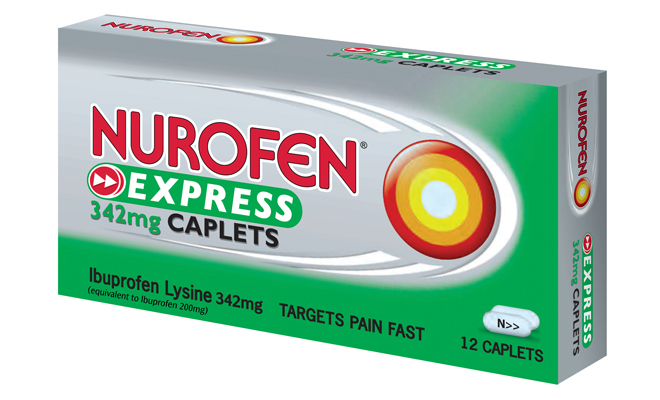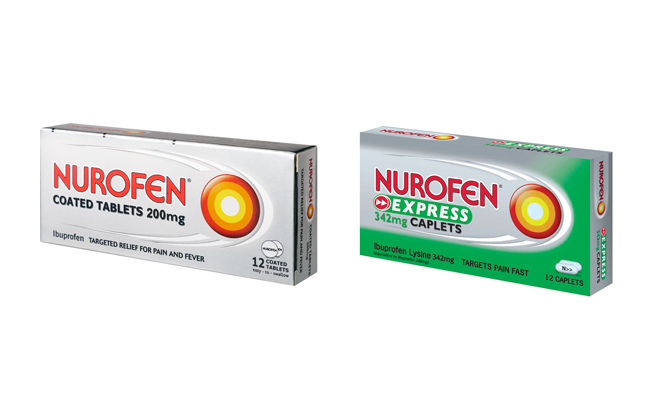
Health x Wellness
What is Nurofen and What is it Good for?
If you haven’t heard, ibuprofen has been reclassified as an over the counter (OTC) drug, which may be good news for those who seek an alternative to paracetamol and aspirin.
To be specific, Nurofen Tablet 200mg, Nurofen Express Liquid Capsule (200mg), Nurofen (ibuprofen lysine) Express Caplets (342mg) have been reclassified, meaning you can now purchase them without a prescription (however, Liquid Capsule has not been launched yet). Nurofen is the trade name of ibuprofen in Singapore.
To raise awareness of its availability as an OTC painkiller, Nurofen commissioned an independent study on the top pain-related ailments here in Singapore. The survey revealed that the most common occurrences are that of headaches (25.7% for women, 29.2% for men), followed by menstrual pain for women (21.8%) and dental ache for men (19.2%). So why do those figures matter?
What is Ibuprofen?
Ibuprofen is a non-steroidal, anti-inflammatory drug (NSAID) that helps relief pain, and is particularly effective at targeting pain that is a result of inflammation; for example, muscle aches, or more commonly, tension headaches, which can be caused simply by keeping one’s head in one position for extended periods of time, a common scenario at work.
Ibuprofen, together with paracetamol and aspirin, are the ‘holy trinity’ of OTC painkillers that is worth keeping in your medicine cabinet. Ibuprofen is readily available in many countries – since 1969, in fact – including the UK, where it was first discovered. They are sold under the names of Brufen, Advil, Motrin and Nuprin, to name a few. However, it was only made available in Singapore in 1999 as a prescription drug.
You must be wondering, why is it only classified as an OTC drug now? Justin Lee, Marketing Manager for RB (Reckitt Benckiser) Singapore, explained that in the 18 years of its use in Singapore, Nurofen proved to have a strong safety profile, which gave them a strong case to present to HSA. With their latest application coinciding with HSA’s readiness to down schedule (reclassification of drug; in this case, from Pharmacy Only Medicines to General Sales List), they were successful in bringing Nurofen to the shelves.
So going to back to study; why does knowing the type of pain matter? It does so you can take the correct painkillers for maximum relief. To shed light on the differences between ibuprofen and other painkillers, we sought the help of Dr Mathew Tung Yu Yee, Consultant Neurosurgeon at Pacific Healthcare Specialist Centre.
AA: What’s the key difference between all three major painkillers – aspirin, paracetamol, ibuprofen – and what are they each particularly good at in relieving?
 MT: Ibuprofen and aspirin are both analgesics with anti-inflammatory properties, and they are ideal for mild migraines. For these migraines, inflammatory chemicals in the brain can be blocked by ibuprofen and aspirin. NSAIDs are particularly effective if a migraine is associated with inflammation elsewhere in the body, for e.g. a migraine associated neck pain due to cervical spondylosis (also known as cervical osteoarthritis or neck arthritis), muscular pain or a migraine associated with a viral infection, or a sore throat.
MT: Ibuprofen and aspirin are both analgesics with anti-inflammatory properties, and they are ideal for mild migraines. For these migraines, inflammatory chemicals in the brain can be blocked by ibuprofen and aspirin. NSAIDs are particularly effective if a migraine is associated with inflammation elsewhere in the body, for e.g. a migraine associated neck pain due to cervical spondylosis (also known as cervical osteoarthritis or neck arthritis), muscular pain or a migraine associated with a viral infection, or a sore throat.
Paracetamol, on the other hand, is an analgesic with negligible anti-inflammatory properties. It is also effective in some patients with a mild migraine. If a mild headache and fever exist purely on its own, paracetamol can be an effective drug as well.
Ultimately, choosing which painkiller to take is highly dependent on the type of pain you are suffering from. In addition, your body make-up is also an important factor in its response to different medications.
AA: It’s understandable if people feel tentative about a new medication. What would you say to them to set their mind at ease?
MT: Ibuprofen is a NSAID, a type of medicine that’s commonly used for pain relief and to bring down fever. The World Health Organization (WHO) lists ibuprofen as one of the most important medicines needed in a basic health system.
Ibuprofen was developed and discovered more than 60 years ago (in the 1950s) by the research arm of the Boots Company in the UK (now owned by Reckitt Benckiser). The leaders of the team were Dr Stewart Adams and his colleagues John Nicholson and Colin Burrows.
Today, ibuprofen is used as an over-the-counter remedy by millions of people to relieve pain and fever.
Nurofen, which contains the active drug ingredient ibuprofen, has been in Singapore for over 18 years and is the only ibuprofen in 2016 to achieve product reclassification status from Health Science Authority in Singapore.
AA: Painkillers are readily available, so it’s easy to take them for granted. What are the long-term effects of using them incorrectly?
MT: Prolonged, inappropriate use of ibuprofen can lead to hypertension, strokes, heart attacks and gastro intestinal bleeding. These risks extend to other members of this group of medicines – the NSAIDs. You may be familiar with some of the prescription NSAIDs e.g. celebrex, arcoxia, ponstan, voltaren are among the most commonly used. In terms of risk, over-the-counter NSAIDs (ibuprofen) have a lower risk of causing these complications than the above-mentioned prescription NSAIDs.
While some experts emphasise the dangers, one should realise that living with pain is devastating and can destroy lives. NSAIDs can be a valuable treatment.
Most experts say that people need to consider the risks of NSAIDs in the context of their personal health. For instance, according to Web MD:
- If you have a history of ulcers, drink heavily, are older, or take steroids for asthma or rheumatoid arthritis, a standard NSAID like aspirin or ibuprofen may put you at higher risk of gastrointestinal problems.
- If you have heart disease or have had a stroke, Celebrex and other prescription NSAIDs may put you at higher risk of having further problems.
AA: Aside from the usual dosage instructions, what other good practices do you recommend?
MT: The best way to manage headaches is to prevent it from arising in the first place. If you have identified a specific trigger, modifying your lifestyle to avoid the trigger is the best way of headache prevention.
For example, neck strains can respond positively to exercise, and physiotherapy and these should always be tried first. Exercise is an important form of pain control as it causes the brain to release endorphins – a powerful and natural pain reliever. Unfortunately, not all triggers are identifiable or avoidable, hence the need for medications.
Where can I get it?

Hitting the shelves very soon is the newly launched Nurofen Express ($7.10), which contains 342mg of ibuprofen lysine to enable fast and targeted pain relief in 10 minutes. The water-soluble lysine salt readily dissolves into the small intestine to speed up absorption into the blood stream for quicker pain relief, reduced inflammation and lower temperature, especially dealing with common pains including headaches, backaches, menstrual pain and muscular aches. Nurofen Tablet 200mg ($5.40) is also available in a pack of 12 tablets.
Nurofen is currently available at all major retailers such as:
- Guardian
- 7-Eleven
- Watsons
- Unity
- FairPrice
- Cold Storage
- Giant
- Sheng Siong









